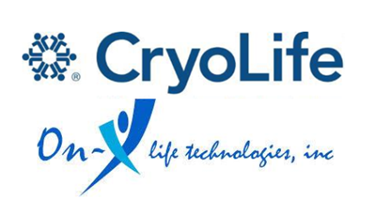CryoLife Pays $130M For On-X Life's Mechanical Heart Valve Business

Atlanta-based CryoLife, a medical device company specializing in cardiac and vascular surgery, has announced plans to acquire On-X Life Technologies (On-X) and its portfolio of mechanical heart valves in a deal worth $130 million. While some question CryoLife’s late entry into the heart valve business, CryoLife’s CEO highlighted On-X’s recent FDA approvals and potential to grow with CryoLife’s sales team support.
“We believe this will be a transformative acquisition for CryoLife that will significantly enhance the size of our addressable market and growth potential,” said J. Patrick Mackin, CEO of CryoLife, in a press release. “This transaction will provide CryoLife access to the $220 million mechanical valve market with a highly advanced portfolio of products.”
In April, the FDA approved On-X’s aortic valve labeling, requiring users of the device to maintain an internalized normalized ratio (INR) between 1.5 and 2.0 when taking warfarin, compared to the 2.0 to 3.0 range that is usually required for patients on a blood-thinning regimen. A lower INR requirement means fewer pills, a reduced risk of anticoagulant complications, and a broader population of patients who could potentially be implanted with the device.
“While anticoagulation therapy remains a necessity for mechanical valve recipients, the FDA’s approval of a significantly lower INR for On-X Aortic heart valves should really change the clinical landscape for many patients,” said John Puskas, chair of Cardiothoracic Surgery at Mount Sinai Beth Israel Hospital, in a press release.
Mackin called the labeling “a distinct competitive advantage” for the device and remarked that On-X’s slow sales in recent years — 13 percent revenue CAGR over the past four years — was due to “modest sales and marketing support” that would more than double when On-X and CryoLife combined and clinical data supporting the heart valves was more widely known.
An analyst for EP Vantage noted that the market has shifted towards transcatheter valves and questioned the wisdom in shelling out $130 million for a company that brought in $33 million last year, though the analyst acknowledged that the surgical valve market remains very large and CryoLife may be able “carve a niche” for itself.
“We believe the acquired portfolio will continue to post double-digit compounded growth from 2015-2020,” said Mackin. “Finally, we believe we will also see strong synergy between our product portfolios, which will drive cross-selling opportunities across our entire business.”
Pending a decision by the executive boards of both companies, CryoLife’s $130 million deal to acquire On-X will consist of 70 percent cash and 30 percent CryoLife stock, and is expected to close in January of 2016.
CryoLife recently received an investigational device exemption (IDE) from the FDA to begin clinical trials on PerClot, a hemostat intended to control bleeding during surgery when conventional means are ineffective or impractical. PerClot received a CE Mark in 2010 and is currently distributed in several international markets. The U.S. hemostatic market is expected to grow to $915 million by 2016.
